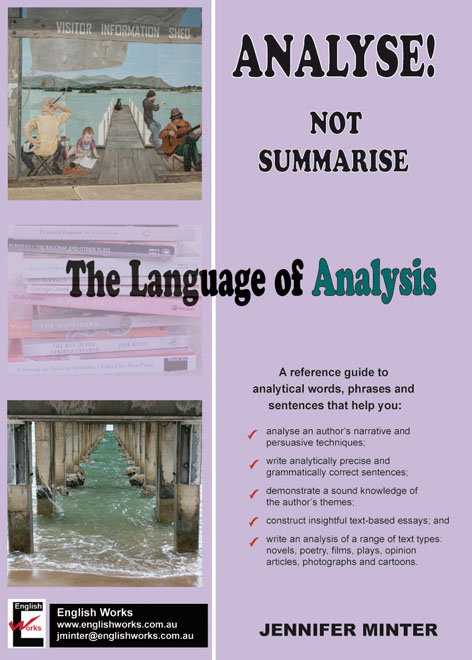Writing a text response essay: notes, tips and sample paras
In a text response essay, you will be assessed on your ability to develop an argument/discussion relating to a prompt, your ability to analyse themes, issues and characters in an insightful way, your ability to identity an author’s intentions and unpack their narrative devices.

It is important to “analyse” not “summarise”. This means you must analyse the author’s narrative “storytelling” devices and think about how they reflect or reinforce the author’s intentions. Our newest workbook, “Analyse! Not Summarise: The Language of Analysis” enables you to rapidly expand your analytical vocabulary and analyse an author’s narrative devices.
Remember, the reason you are studying your particular text is because it contains complex and thoughtful themes. You must discuss the text’s complexity, but in a systematic way. Start with the simple and obvious points and then show a progression of thoughts.
If you are getting around a mid-range C-B, you may need to work on:
Topic sentences
- Sharper and more analytical topic sentences. Make sure they directly answer the question and set up a paragraph that will develop the main theme in a thoughtful and profound way.
- Make sure that each topic sentence has a different focus so as to avoid repetition. In a B-range essay there is often considerable repetition of ideas.
Evidence
- Evidence: you must be as analytical as possible and avoid general statements. Show an insightful knowledge of the text by choosing key evidence/insightful/ ambivalent examples in the text to support the topic sentence.
- Build your discussion around the author’s intentions, purpose, narrative devices. These will keep the focus on analysis rather than summary.
- Be sure to show readers/assessors that you are capable of precise and accurate analysis of characters, themes and significant moments/turning points in a text’s narrative.
The flow of ideas throughout the paragraph
- Take each topic sentence and brainstorm the points/quotes/insights that you must include in the paragraph. Group together similar ideas and then delve deeper.
- Make sure that your paragraph flows. Do not just cobble together a list of statements or quotes. Make sure that each point follows and adds to the previous point.
- Make sure you give priority to the narrative devices.
- Do not just add irrelevant details in order to pad the paragraph; or if there are two perspectives/views on the statement, include them separately.
- Please see sample paras on Romeo and Juliet.
Expression
- Awkward phrases: work on sophistication of expression. Avoid clumsy verb phrases. Use nominals. Work at incorporating quotes into the grammatical construction of your sentence. Use a combination of short, snappy sentences and longer sentences. Do not lose control of the subject. See Notes on Improving Expression.
Quick Tip
Write a 1-2 page summary of the “most important” or key points/issues in the text. Ask yourself, if you had to write a response on this text, what could you absolutely not leave out, or omit to mention (taking into account that given the prompt, you may make a short or longer reference to this key piece of evidence/quote/views/values.)
- See Writing a Comparative Essay
- See Romeo and Juliet : Study Page
- See Macbeth: Study Page


